Right now, many of us are thinking about back to school decisions. Educating your child in a pandemic is no easy task. Homeschooling? Distancing Learning? In-person school? Even if we are privileged to have a choice, making hard decisions for our families can feel agonizing.
You may even lose sleep over it.
That’s why I’m sharing the 9 things you need to know about educating your child in a pandemic.
GET THE FREE WORKSHOP
You can also listen to this here:
Podcast: Play in new window | Download | Embed
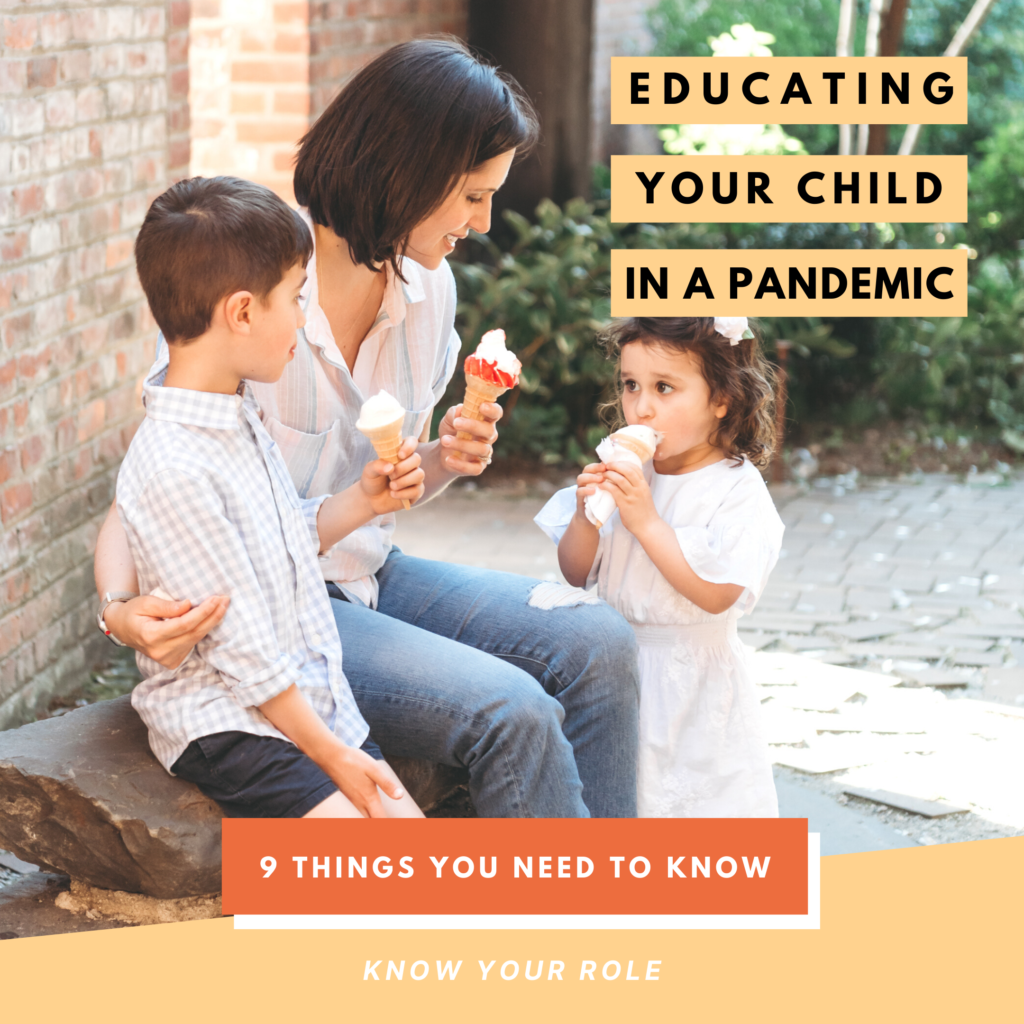
Know Your Role
The year was 1992 and I was nervous. It was August and I was entering the third grade. I was anxiously waiting to find out who my assigned teacher was for the year. There were four teachers in the third grade, and two of them were ‘yellers’. You know what I mean by the “yellers”—the teachers you could hear shouting at their students from all the way down the hall.
My odds weren’t good. I waited with bated breath. Finally the news came, I got a yeller.
And I cried. And cried.
Fast forward 28 years. I can reflect back on those childhood tears. I now have an understanding that education is far more than rote memorization and the acquisition of knowledge. All effective education is grounded in a warm and loving relationship between an adult and child. While at the surface level we equate education with cognitive development, the roots run much deeper than that. To teach a child on intellectual ideas, you must first connect with the child on an emotional level.
Many of you will be playing the role of educator this year. Maybe as a support person for distance learning or perhaps as a homeschool parent. If that is you, then know this:
You can’t scream an education into a child. But trust me…you are going to be tempted to try.
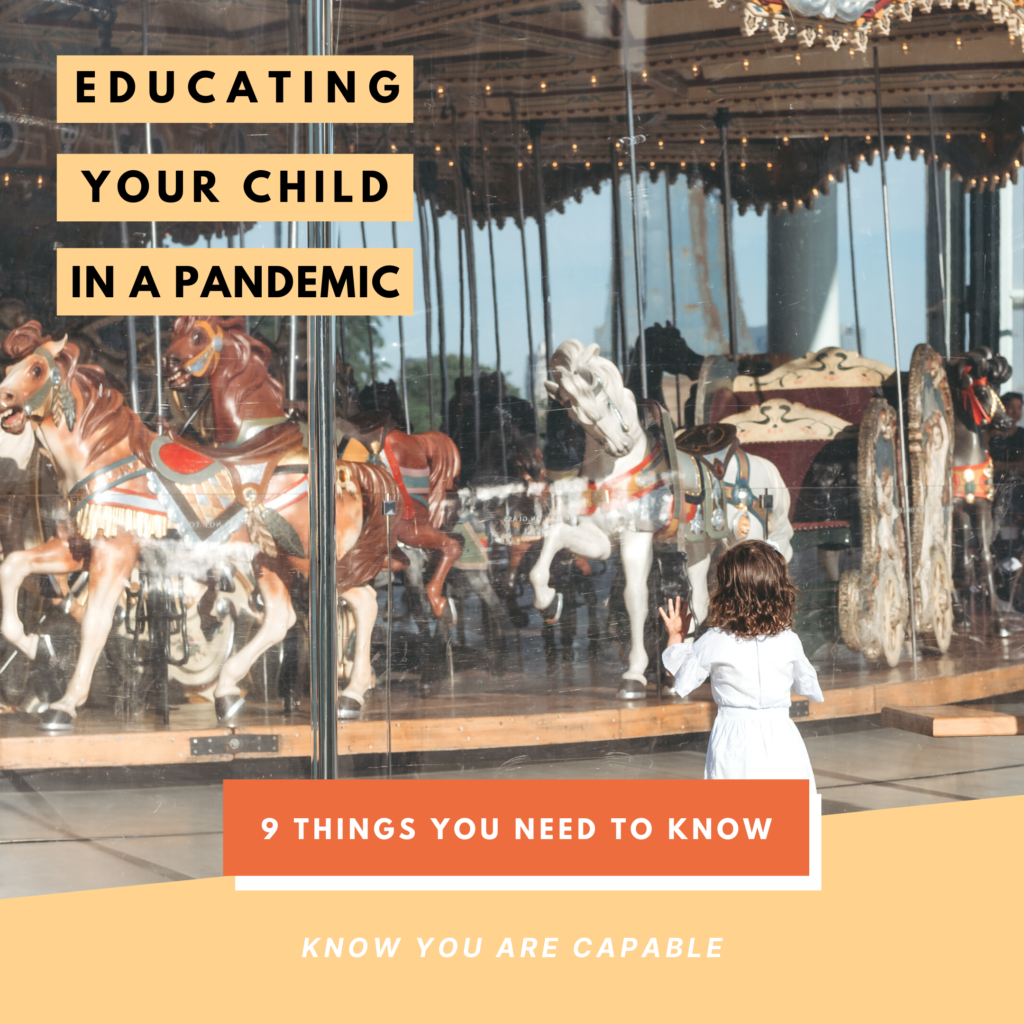
Know You are Capable
When it comes to educating your child in a pandemic, you may be plagued with the imposter syndrome. There’s a good chance you feel unqualified and/or unmotivated.
Personally, I am trained across disciplines. I’m a Clinical Social Worker with years of experience practicing child & family therapy. I also have a Ph.D. in Early Childhood Education and Development. Basically, if psychology, human development, and education had a baby—that baby would sort of be me.
And I want to tell you, even with all the qualifications in hand—being an educator to my own children is just. plain. hard. There’s no easy way around that. I will not sugarcoat it. [Listen to my episode on Homeschool Reflections]
Because most importantly, I’m a mom. I’m a mom who has taught my own children. I’m a mom who has gritted her teeth through the hard moments of parenting (in fact, there was some teeth gritting happening just this morning…). I am a mom who has worked intensely to avoid being a “yeller”.
I want you to know that there is a good chance you may feel the same. But if you are choosing to be an educator for your children this year, you are capable. If you are doing it because you have no other choice, you are still capable.
Because you can do hard things.
I will be the first one to tell you that it’s a heckuvalotta work to make sure my kids are just fed and clean everyday. And also like you, I already wear a lot of hats in my family. Even if you are doing distance learning with a certified teacher behind a screen, you are going to be taking on a role of educator in your home. You are going to be the human connection and support person that helps to bring it all together.
So when this educator hat gets tossed onto your head unexpectedly, you may find yourself worried that it might not suit you. Or perhaps it’s not your size and it’s squeezing your skull making your brain nearly burst.
Even if you never planned or prepared for this, you are capable. You can absolutely rock that educator hat whether its your style or not. As a responsive, loving parent, you have all the tools within you to support your child through this year of school.
But nobody said it’s going to be easy.
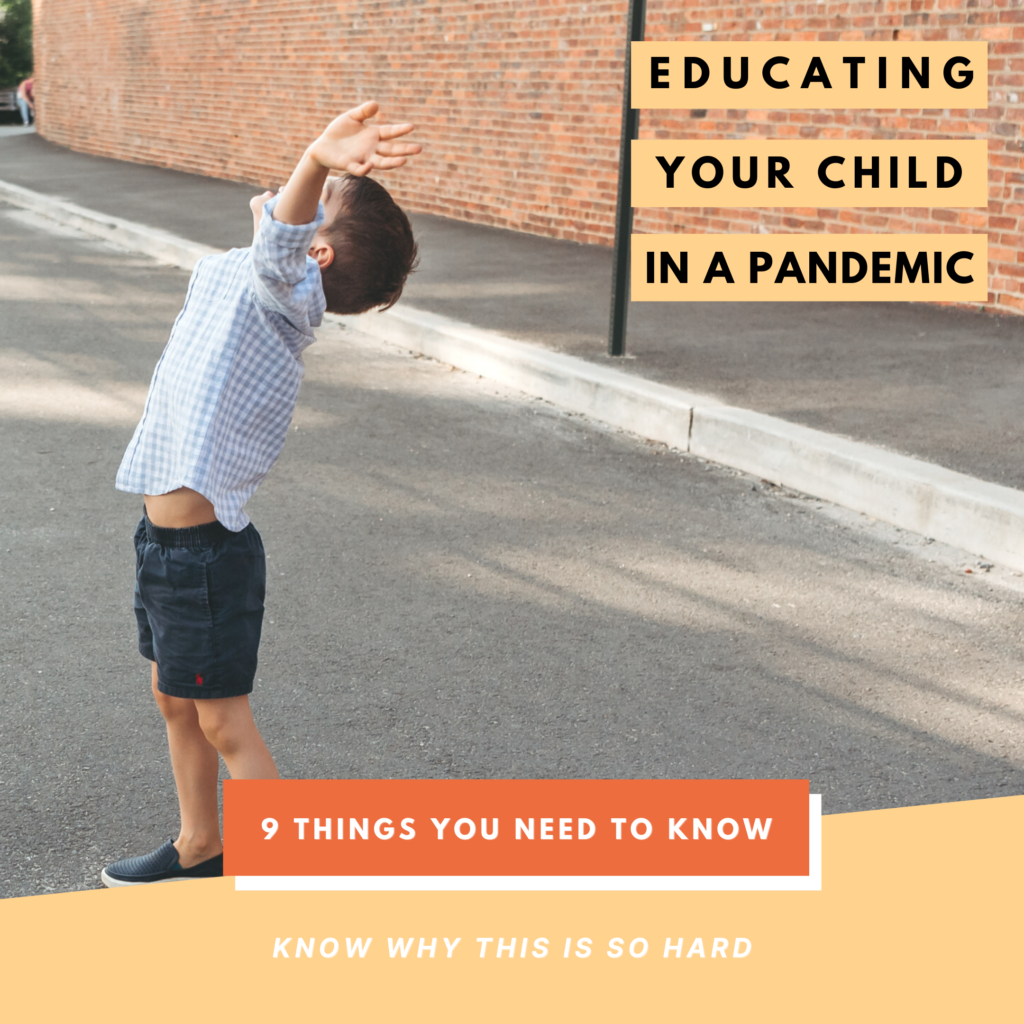
Know Why This is So Hard
Let’s admit that many Americans have secret pipe dreams of sending at least one child to Harvard. On full scholarship, of course. When it comes to education and our kids—we dream BIG from the earliest of years. We want them to reach for the stars and strive to give them as many stepping stones towards those stars as possible.
Now enter a global pandemic. Many of our big dreams are derailed. The year 2020 is a year of loss and we are in mourning. Not only has there been dramatic loss of life, but also loss of human connection, education, work opportunities, and income.
We are grieving. But it’s probably not the type of grieving that is associated with a loss of life. The type of losses we are experiencing are called “ambiguous loss”. Ambiguous loss is a loss that occurs without closure or understanding. It leaves us looking for answers and solutions—while we are simultaneously still sitting with the undeniable sting of grief.
Examples of ambiguous loss include infertility, cultural loss that occurs with immigration, and having a parent with dementia. Or often, living with a loved one who has been changed by mental illness or addiction.
For decades, researcher Pauline Boss has been exploring the concept of what she coined “ambiguous loss”. This type of loss is characterized by uncertainty. There is no certainty that life will return to the way it used to be. There is no certainty that we will be gainfully employed tomorrow. There is no certainty there will be bacon and toilet paper at the grocery store.
Pauline explains that we are a mastery-based society that is focused on checking boxes and moving on. Losses that are rooted in uncertainty for the future are perhaps the most uncomfortable. Because we are not equipped to sit with uncertainty. We have very little tolerance for unanswered questions.
Because, well, Google. When was the last time you were forced to sit with the idea of “not knowing” something?
So here we are. We are mourning our own losses but we are also mourning losses on behalf of our children. Mourning the loss of a “regular” play-based kindergarten class. Mourning the loss of facial expressions that are blocked through masks.
This wasn’t the way it was supposed to be. We are festering deep within our grief and we feel stuck.
But know this: Kids are incredibly resilient. Even if some of our dreams for them feel broken, our children will not be broken by this.
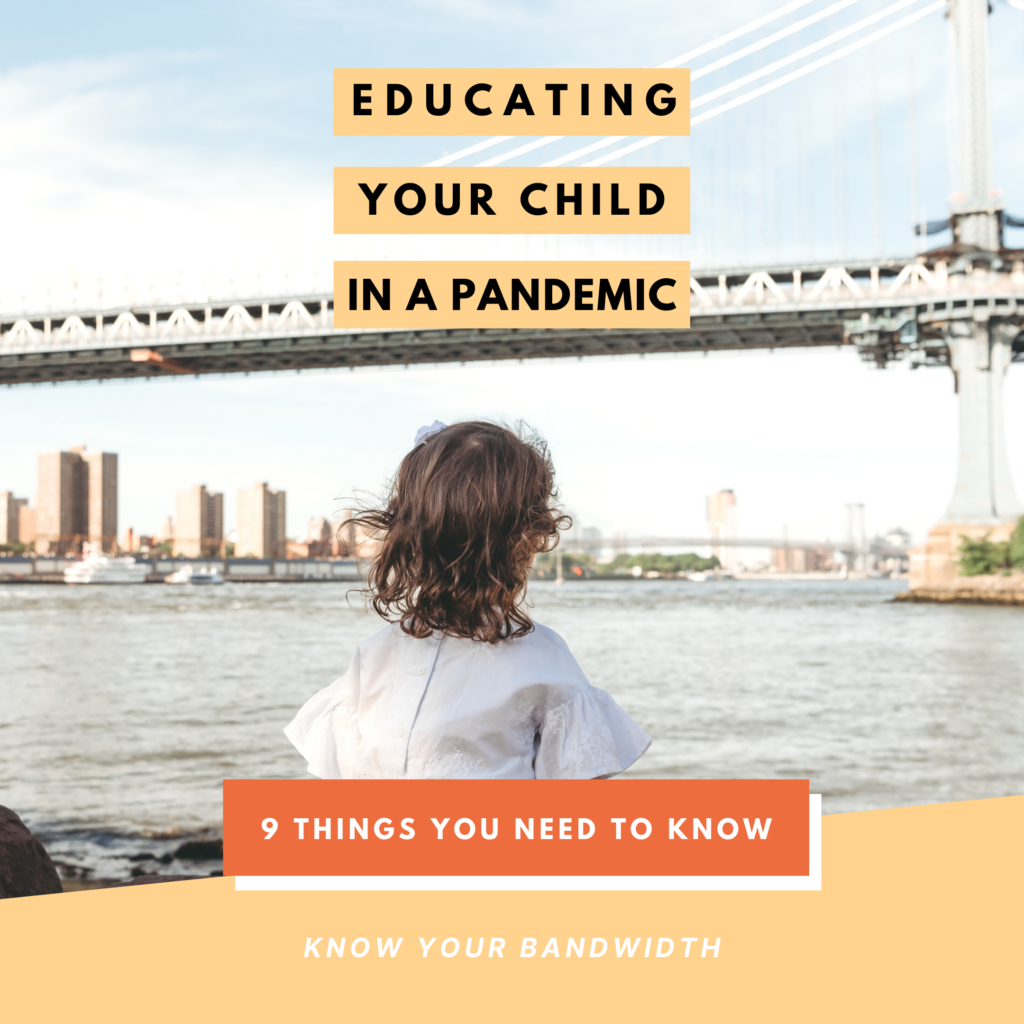
Know Your Bandwidth
The flowers bloomed in the Spring, the sun heated up this Summer, and invariably the leaves will fall this Autumn. The outer world keeps moving forward yet it feels in direct conflict from our inner worlds which are frozen with uncertainty.
We are all grieving. We have missed important cultural events like graduations, funerals, weddings…all events that signal big life transitions and allow us to move forward. Without these transitional gatherings and our communities to surround us, life feels like it has stalled.
So when I ask, “How are you?” I really want to know, “How ARE you?”
Because your well-being matters. There is an abundance of research that examines the correlation between parental well-being and child well-being. The studies point to the fact that the way we feel as parents has a great impact on our children. And if you are going to be educating your child in the pandemic this school year, then you need to be working on you.
- You need to be practicing self-care.
- You need to be journaling, reflecting, and talking about this life-altering year of 2020.
- You need to let yourself grieve.
- In order to best serve your family, you have to be caring for yourself.
If you are in the stage of grief that has you feeling burnt out and angry, you need to work on you first.
Because remember, to learn, children need a warm and loving relationship with an educator. And that my friends is your real work this year: First, love yourself. Then, go love on your child. When it comes to the education bit, the rest will come.
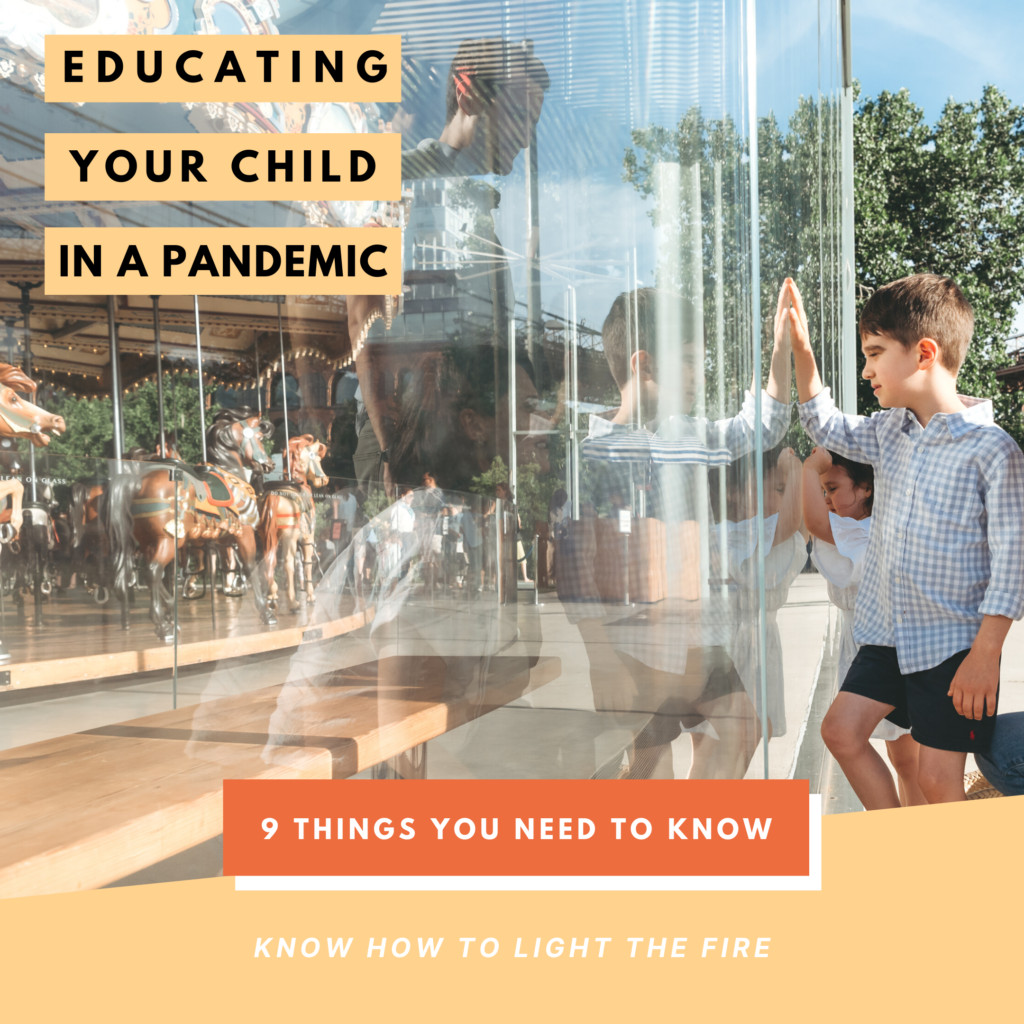
Know How to Light the Fire
It’s time that you re-evaluate the goals for your children’s educational journey. This year, we won’t be checking all the boxes on the way to a full-ride in the Ivy League. I’ll quote William Butler Yeats, who famously said that “Education is not the filling of a pail, but the lighting of a fire.”
As parents, it’s easy to get sucked into the idea of filling the pail. Does your distance learning have 10 tasks? Check those boxes and you are done for the day.
But when it comes to educating our children in a pandemic, we need to refocus on energies on lighting the fire. How do we foster a love of learning? Because without it—learning becomes duteous. It becomes just another obligation.
As the parent educator, we can light that fire though attunement, connection, and curiosity.
Why attunement?
Attunement is about setting aside the adult agenda and paying attention to the needs of our children. Maybe your kid is throwing a huge fit about having to handwrite a paragraph for his distance learning homework. So you offer to do the writing while he dictates the words to you. Or your daughter is bouncing off the walls during her daily Zoom session. Instead of repeatedly threatening to take away her TV time, simply tell the teacher that you’ll be taking her outside for some (much needed) movement.
When we are in tune with our children we meet them where they are at. We notice their struggles and support them when we can, but we also know when to fade ourselves out and give them the wings to fly when they are ready.
Why connection?
Connection is an emotional closeness that we feel to another person. You might know what each other are thinking. Perhaps you can finish one another’s sentences. When connection is strong, the working relationship proceeds almost effortlessly. But often disconnect happens due to distractions, irritability, or other stressors. The connection must be reestablished in order to proceed with teaching.
Why curiosity?
Our children are natural-born explorers. When they are allowed to learn about topics and ideas that are inherently interesting to them—they will thrive. Traditional schooling doesn’t always lend itself to pursuing new ventures based on interests…but if you make space for it at home, it will make a difference.
You won’t always get it right. You will need to give yourself plenty of mental health days. So let’s forget about filling the pail of knowledge and start lighting the fire for the love of learning.
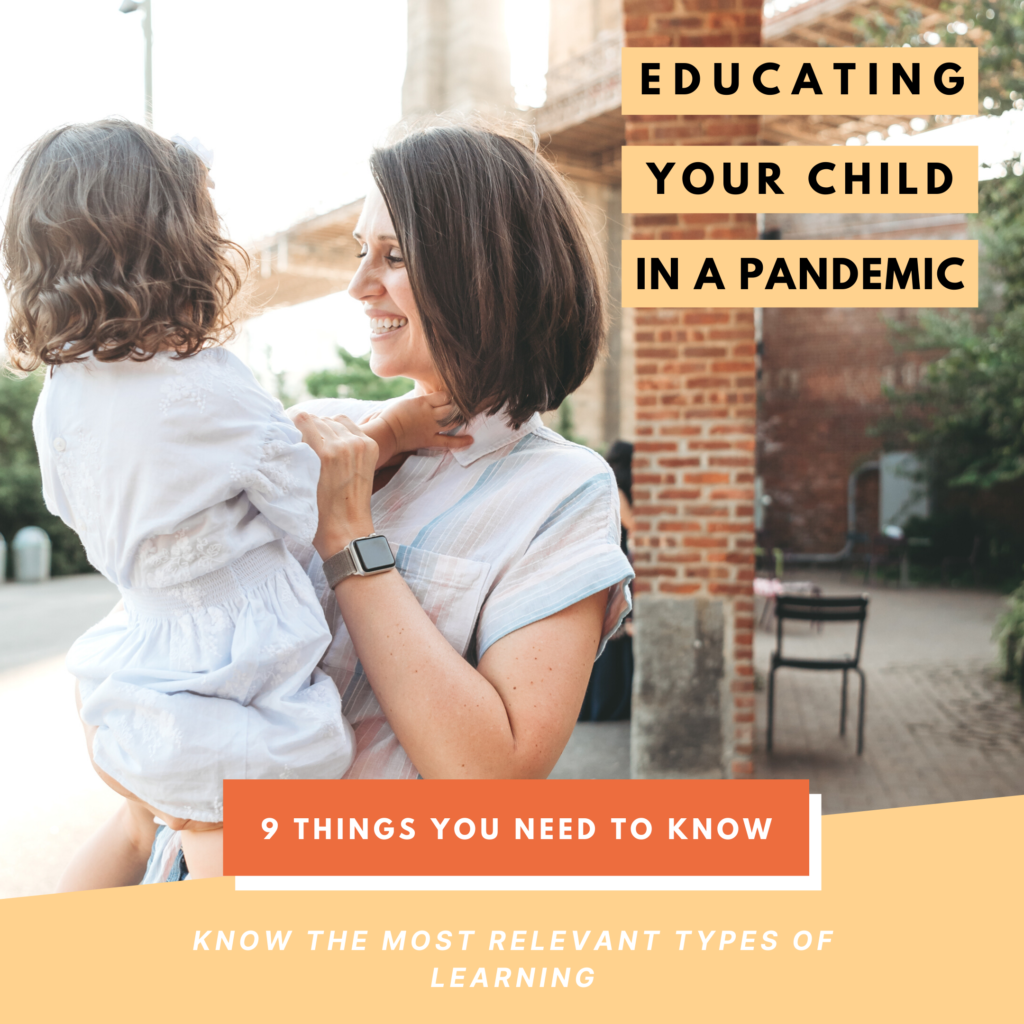
Know The Most Relevant Types of Learning
“My kid hasn’t learned anything since March!” I heard a dad say recently.
I beg to differ. Perhaps your child hasn’t memorized the date that World War II began. And she hasn’t completely learned how to do long division. But that doesn’t mean that she isn’t learning.
A generation ago, learning was heavily based on memorizing content. We grew up in a world where content was harder to access. If you wanted to find an answer to a question, you had to drive to the library and use the Dewey Decimal system to find a book to answer that question. Today, content lies at our fingertips. The result is that learning is focused less on the acquisition of content and more on learning how to use the content.
It is believed that to give our children the tools they need to thrive in a 21st century career, they need have an education focused on the 4 C’s: Critical Thinking, Creativity, Collaboration, and Communication.
The good news is that our kids are learning all of these things every day, whether we realize it or not. To foster the 4 C’s at home here’s what we can do:
- Commit ourselves to be life-long learners
- Foster and encourage curiosity
- Allow for open conversations and discussions
- Find joint interests to explore together
Do our kids benefit from learning within a community of their peers? Yes, absolutely. But can they learn with just their family at home? Yes, absolutely. Let’s start to appreciate the 4 C’s and the “undercover” learning that takes place in the every day lives of a family. If you can do that, I promise you will feel more confident that you are providing the tools your kids need for a successful future.
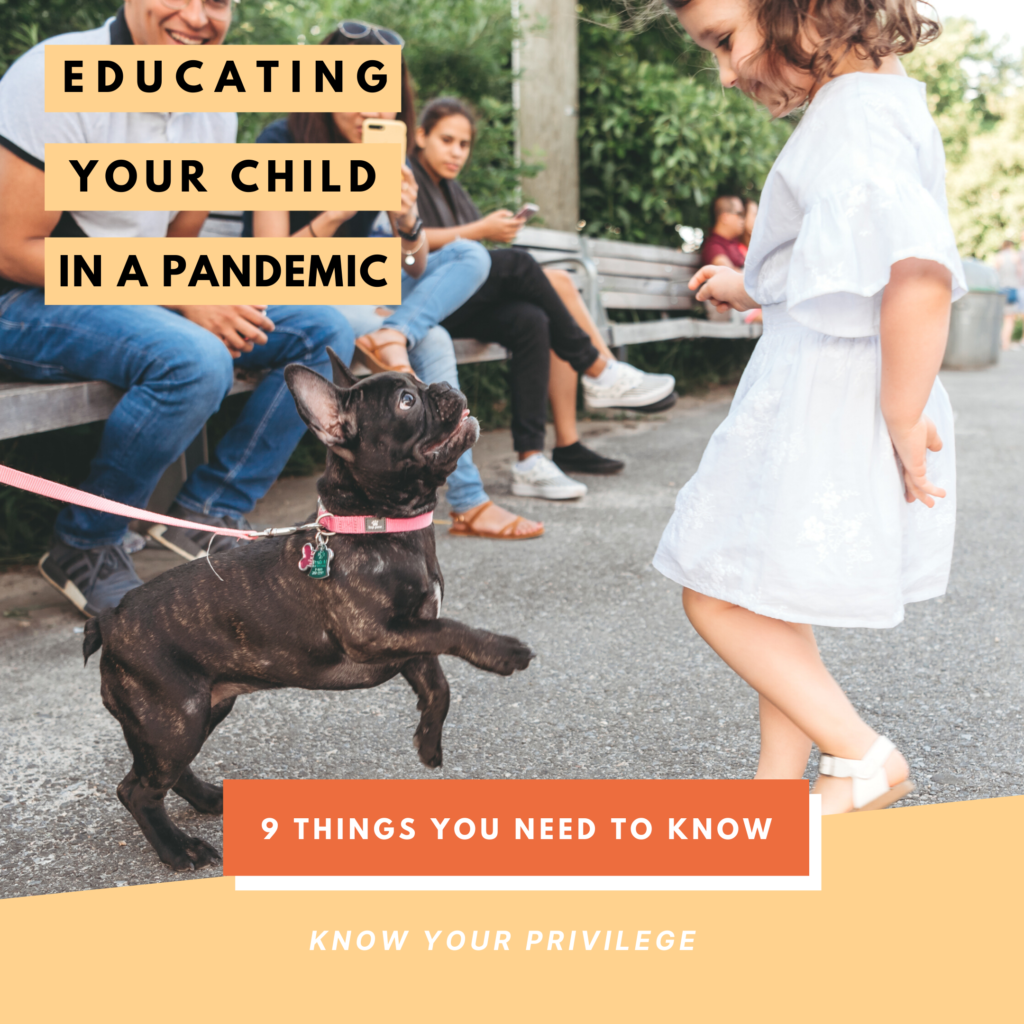
Know Your Privilege
I know that it feels like we are all faced with hard decisions about education right now. And when we only know our own reality, it can be hard to appreciate the privileges which many of us have. Choosing to keep your kids home is a privilege , even if it’s not a privilege you want.
I’ll never forget my first client when I was a young social worker just out of graduate school. I was working to reunify families who were separated due to abuse and neglect. Her daughter was removed from her custody because she had left the child with a neighbor while she went to work. On repeated occasions, the neighbor sexually assaulted the child. And the mother knew.
Does that sound like an unforgivable offense?
As a non-English speaking immigrant without family in the country, her benefits and access to social services were limited. She desperately needed to keep her job to bring in an income to feed her child. But to go to work, she needed child care.
So what should she do? Leave her child with a sex offender and go to work? Or quit her job and land in a homeless shelter, with the risk of losing custody and deportation?
Don’t answer that question. I’m praying that you never have to answer that question for your own children.
Have you ever had to make decisions like THIS?
Because in the current state of the world, there will be families making difficult decisions like this due to distance learning and COVID. There are families all across the world that are making choices between food and safety.
I have never had to make decisions like this. I have never had to leave my child with an unsafe caregiver. I am privileged.
If you never have to make decisions like this, you are privileged. If you get to choose between homeschool and distance learning and sending your kids to school, you are privileged–even if you don’t want that privilege. I just want to say, whatever happens with your kid’s education this year, they are going to be okay. Will it be ideal? Heck no. But they are going to be okay.
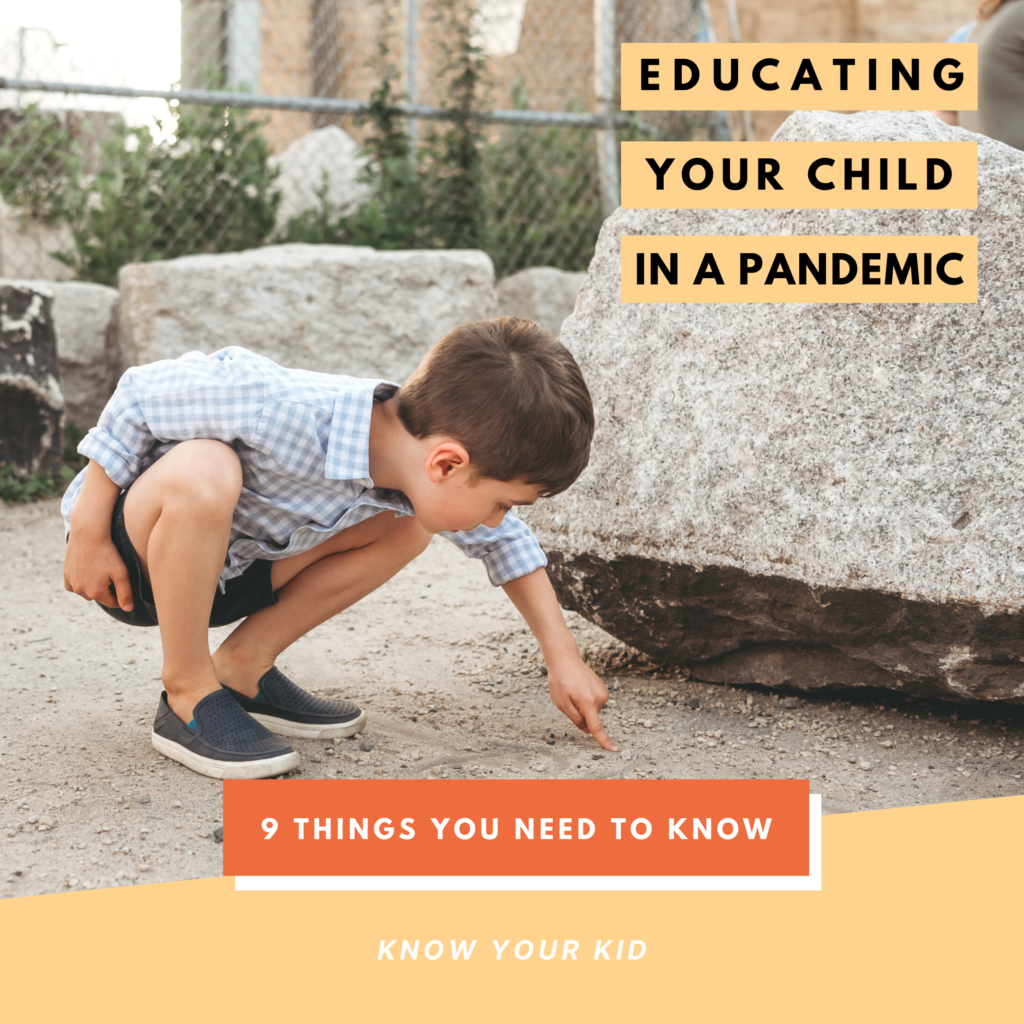
Know Your Kid
As the parent, you know your kid better than anyone. Which is why it’s important for you to advocate for and provide them with two things: an individualized education and movement.
What is an individualized education? Traditional schooling is geared to meet the needs of children who fall right in the middle of the learning curve. But many, many children do not fall smack in the middle. Some children fall behind the curve and others are ahead of the curve. Even within subjects, there can be variation. You may have a child who is ahead of the curve on reading and behind the curve on math. Which is why it is important to recognize and tailor an education towards each child’s needs.
What happens when you don’t give a child an individualized education? Often, you will see low motivation and behavior challenges. Children who are bored (i.e. the work is too easy) or struggling (i.e. the work is too hard) will act out with difficult behaviors or withdraw and refuse to engage.
Homeschool curriculums are especially good at meeting individual learners where they are at. Distance learning may or may not be good at this. If your child is participating in distance learning, it is your job to be the advocate to let the teacher know if the materials are not meeting their needs. Keep an eye out for too much busy work or too much struggle. Neither of which are good for fostering the love of learning.
Keep an eye on the curriculum, but also ensure that your child’s movement needs are being provided for. Our children have been cooped up and understimulated for months. Whether you send them to school or keep them home, you have to ensure that they are getting the appropriate amounts of movement. Movement is directly linked with brain development and learning.
Sit down and learn for a few minutes then get up and move. Or better yet, get moving and learning at the same time. To keep our kids learning, we have to make sure their bodies and brains are adequately engaged.
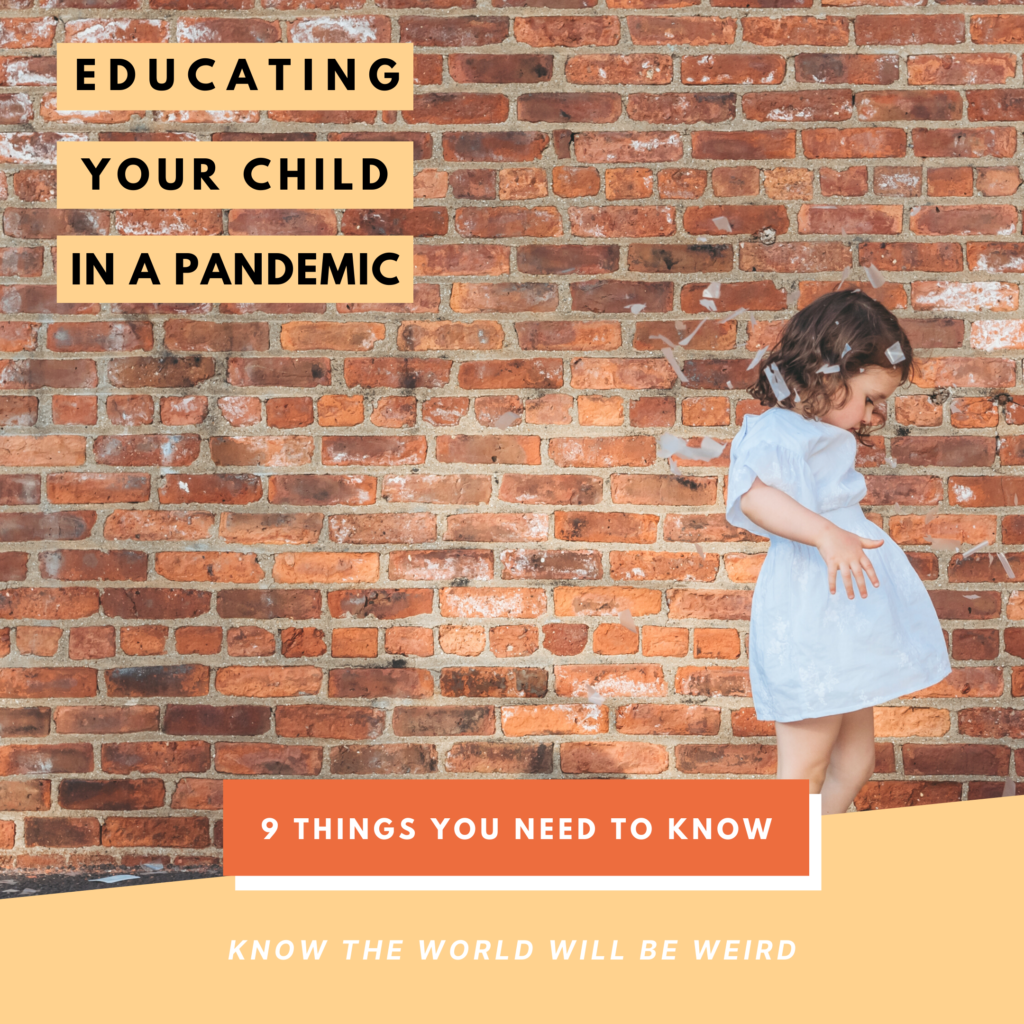
Know the World Will Be Weird
When I first saw the CDC guidelines for back-to-school, I was like, “Oh, helllllllll no”. Verbatim. Because the thought of sending my kids in masks, standing six feet apart felt so far from the childhood that I want for my kids.
Yes, sending your kid to school in a mask is going to feel weird. Totally weird. But keeping them home is also going to feel weird. Because there’s a good chance you have already been at home for months and months. And perhaps you feel your sanity slowly slipping away in the process. If you keep them home, almost every time you leave the house, you are going to be faced with the weirdness of the world—even as a homeschooler. At least where I live…masks, distancing, plexiglass, it’s all going to be there whether kids go to school or not. At the grocery store, the bank…basically any public location that we take our children.
The world is going to be weird whether inside of school or out. So choose what is right for your family. Don’t ask your neighbor. Don’t ask me. Ask your gut. Trust your instincts.
LIKE THIS POST? PIN IT!

Right now, most of us are thinking about back to school decisions, homeschooling distance, learning in-person school. Even if we are privileged to have a choice, making hard decisions for our families can feel excruciating. You may have even lost some sleep over it. That's why we're talking about it here on the podcast today in this episode, episodes 229, I'm sharing what you need to know to educate your children in a pandemic. Hi, this is Denaye. I'm the founder of simple families. Simple families is an online community for parents who are seeking a simpler more intentional life. In this show, we focus on minimalism with kids, positive parenting, family wellness, and decreasing the mental load. My perspectives are based in my firsthand experience, raising kids, but also rooted in my PhD in child development. So you're going to hear conversations that are based in research, but more importantly, real life. Thanks for joining us.
Hi there, and thank you for tuning in today. If you are new to simple families, thank you for being here. If you are coming back, I'm so glad to have you as well. I want to tackle this big and controversial subject of educating your children in a pandemic because at least we here in the US are faced with a lot of decisions. Some of us have a choice and some of us don't, I'm not here today to tell you what to do for your family. But I do want to tell you a few things that I think you need to know moving forward. Let's rewind to the year in 1992, I was nervous. It was August and I was entering third grade. And each year in August, a few days before school started, they would post on papers in the window of our elementary school, who our teachers were for the year.
And this year was especially stressful for me because I was at during the third grade. And in the third grade, there were four teachers and two of those teachers were yellers. And you probably know what I mean by the yellers. There were teachers who you could hear shouting all the way down the hall at their students. So I knew my odds. Weren't good. Two out of four. So I waited and waited. And finally the news came, I got a yeller and I cried and cried now, fast forward 28 years or so, I can reflect back on those childhood tears because now I have an understanding that education is far more than rote memorization or the acquisition of knowledge. In fact, all effective education is grounded in a warm and loving relationship between an adult and a child.
Well, at the surface level, we equate education with cognitive development. The roots run much deeper than that. To teach a child on intellectual ideas, you first have to connect with the child on an emotional level. You have to have a relationship. Now, many of you listening, I know are going to be in the role of educator this year. Maybe you'll be a brand new homeschool parent. Maybe you'll be a support person for distance learning, whatever your role is. If that's you that know this, you can't scream an education into a child, but trust me, you are going to be tempted to try, because it's not going to be an easy year. It's going to be filled with challenges, but I want you to know that you are capable when it comes to educating your own children. You might be plagued with imposter syndrome. There's a good chance that you feel unqualified or unmotivated.
Maybe both personally, I'm trained across disciplines. I'm a clinical social worker. And I have years of experience practicing child and family therapy. I also have a PhD in early childhood education and development. So basically if psychology and human development and education had a baby, that would sort of be me. But I want to tell you, even with all the qualifications in hand, being an educator to my own children is just plain hard. There's no easy way around that. I will not sugarcoat it back in episode 223, I talked about our homeschool reflections for the year. In that episode, I talk about our experiences and I talk about our plans for moving forward. So if you missed that episode, rewind and listen to that. But back to where I was, I'm not going to sugar coat it. It's not easy.
And I know this because most importantly, I'm a mom. I'm a mom who has taught my own children. And I am a mom who has gritted my teeth through the hard moments of parenting. In fact, there was some teeth gritting in the education process this morning. I'm also a mom who has worked intensely to avoid being a yeller. And I want you to know that there's a good chance that you might feel the same. If you're choosing to be an educator for your children this year, whether a homeschool parent or distance learning supporter, you are capable. Even if you're not choosing this, even if you're doing it because you have no other choice, you are still capable because you can do hard things. That's something I tell my kids all the time. Sometimes you have to flip it around and believe in it yourself. So if this sounds like you maybe you're a little unmotivated or you feel like you're unqualified, I'll be the first to tell you that it's a heck of a lot of work, just to make sure that my kids are fed and clean day.
And like you, I already wear a lot of hats in my family. And you, maybe you don't even see yourself as an educator, especially if you're doing distance learning, but I want to reassure you. Even if you are doing distance learning with a certified teacher behind the screen, you are still going to be taking on a role of educator in your home because effective education requires a human connection and support person to bring it all together. And that's where you'll come in. So if this educator hat gets tossed on your head unexpectedly, you might find yourself worried that it doesn't suit you, or perhaps it's not your size. And it's squeezing your brain and making it feel like it's going to burst. Even if you never planned or prepared for this, you are capable. You can absolutely rock that educator hat, whether it's your style or not as a responsive, loving parent, you have all the tools within you to support your child through this year of school. But nobody's said, it's going to be easy. Now. I think you need to know why this is so hard. Let's admit that maybe not you, but many Americans have secret pipe dreams of sending at least one kid to Harvard, definitely on full scholarship. When it comes to education and our kids, we dream big from the earliest of years.
We want them to reach for the stars and strive to give them as many stepping stones towards those stars as possible. Now enter a global pandemic. Many of our big dreams, education related or not have been derailed this year 2020 is a year of loss and we are in mourning something. I don't think we've given much consideration to not only have there been dramatic losses of life, but also losses of human connection, education, work, opportunities, income. We are grieving, but it's probably not the type of grieving that's associated with a loss of life. Instead, this type of loss that we're experiencing is called ambiguous loss. Ambiguous loss is a loss that occurs without closure or understanding. It leaves us looking for answers and for solutions while we're still simultaneously sitting with this undeniable sting of grief.
A few examples of ambiguous loss or things like infertility or the cultural loss that occurs with immigration and assimilation, or having a parent with dementia, who is their present physically, but somewhere else, mentally or often living with a loved one, who's been changed by mental illness or addiction for decades. Researcher, Pauline boss has been exploring this concept, which she coined ambiguous loss. This type of loss is characterized by uncertainty. There is no certainty that life is going to return to the way that it used to be. There's no certainty that we will be gainfully employed tomorrow, and there's no certainty that there's going to be bacon and toilet paper at the grocery store in Pauline's work. She explains that we are a mastery based society. In essence, that means we're focused on checking off boxes and moving on finished first grade, moving on to second finishes, second grade, moving on to third, but losses that are rooted in uncertainty for the future are perhaps the most uncomfortable because we're not equipped to sit with uncertainty.
We have very little tolerance for unanswered questions. And for this I blame Google because when was the last time that you were forced to sit with the idea of not knowing something, when you have an abundance of information and resources at your fingertips at all time. So here we are, we're mourning our own losses, but we're also mourning losses. On behalf of our children. We're mourning the loss of a regular play-based kindergarten class. We're mourning the loss of facial expressions that are blocked with masks. This wasn't the way it was supposed to be. We are pestering deep with grief and we feel stuck, but I want you to know this. Our kids are incredibly resilient. And even if some of our dreams for them feel broken, those dreams might be broken, but our children will not be broken by this, this time of grief and loss can feel confusing for all of us.
I remember distinctly feeling confused by the fact that the flowers were blooming this spring, and then the sun got hotter this summer. And invariably, the leaves are gonna fall this autumn because the outer world keeps moving forward. But that feels in direct conflict with our inner worlds, which can feel frozen with the uncertainty. I'll say it again. We're all grieving. We have missed important cultural events like graduations, funerals, weddings, all events that help us to signal and process these big life transitions. And without these transitional gatherings and without our communities to surround us and support us through them, life can feel like it has stalled. So if I ask you, how are you? I really want to know how are you because your wellbeing matters. If you're going to be serving in an educational capacity for your children this year, it's important to consider this.
There is an abundance of research that examines the correlation between parental wellbeing and child wellbeing, and the studies point to the fact that the way we feel as parents as a great impact on our kids. And if you're going to be putting on this additional hat of educator this fall, then you have to be working on you. You need to be practicing self care. You need to be journaling and reflecting and talking about this life altering year. You need to let yourself grieve. You need to recognize the losses in order to best care for your family. You're going to have to be caring for yourself and know that if you find yourself in the stage of grief, that has you feeling burnt out and angry, you need to work on you first, because remember to learn, children need a warm and loving relationship with an educator.
And that my friends is your real work. This year. First love yourself, and then go love on your family. When it comes to the education bit, the rest will come. Now I know that's easier said than done, right? Because we have big dreams for our kids' education. And we also have big goals, but it's time to reevaluate the goals that we have because this year you won't be about checking all the boxes on your way to a full ride at an Ivy league school. Instead I'll quote William Butler Yeats, who famously said, education is not the filling of a pail, but the lighting of a fire this year, that's what you're going to be doing. You're going to be working on lighting the fire. But as parents, it's easy to get sucked into the idea of filling the pale of checking off all the boxes. If you're distance learning and you have a list of 10 things that need to get done, you might find yourself feeling this way.
But when it comes to educating our kids in a pandemic, we have to refocus our energies on lighting the fire. How do we foster a love of learning? Because without it learning becomes duties, it becomes something done purely out of obligation. As the parent educator, you can foster the love of learning and light that fire through attunement, connection and curiosity. So first let's talk about attunement. Attunement is about setting aside your own agenda and paying attention to the needs of your child. Now, I'm not saying put your kids ahead of you. I'm saying if you have a giant to do list of things, you want your kid to get done for school today, it may or may not jive with what they're able and willing to do. So you have to recognize that maybe your kid is throwing a huge fit about having to hand, write a paragraph for his distance learning homework. So you offer to do the writing while he dictates the words to you. You find a balance or perhaps your daughter is bouncing off the walls during her daily zoom session, instead of repeatedly threatening to take away her TV time. Simply tell the instructor that you're going to be taking her outside for some much needed movement, and then make a couple of mental notes. Make sure to get her moving before the zoom session. Next time,
When we are in tune with our children, we can meet them where they are at. We notice their struggles and we can support them. But we also know when to fade ourselves out and give them the wings so they can fly when they're ready. Now, what about connection? Connection is about the emotional closeness that we feel to another person. Maybe, you know what each other are thinking. Maybe you can finish each other's sentences when connection is strong, the working relationship between you and your child will proceed almost effortlessly, but often disconnect happens maybe due to distractions or irritability or other stressors. The connection has to be re-established in order to proceed with teaching, you won't always get it right. You're going to need to give yourself plenty of mental health days. And third let's talk about curiosity. Our children are natural born learners, and when it comes to establishing a love for learning, curiosity is the best way to do it.
When our kids are allowed to learn on topics and ideas that are naturally interesting to them, they will thrive traditional schooling. Doesn't always lend itself to pursuing new ventures based on interests. But if you're home strive to make space for it, it will make a difference. Now you're not going to always get it right. You're going to need to give yourself plenty of mental health days, but try to forget about filling the pale of knowledge and start lighting the fire for the love of learning. If you can just focus on attunement, connection and curiosity, the rest will come. I recently heard a dad say, well, my kid hasn't learned anything since March, and I'm going to say, that's not true.
Perhaps your kid hasn't memorized the date that world war two began. And she hasn't completely learned how to do long division, but that doesn't mean that she isn't learning. If we look back a generation ago, learning was heavily based on memorizing content. I for one grew up in a world where content was harder to access. If I had a question, I didn't have a phone, I could Google it on. I'd have to go to the library and maybe even use the Dewey decimal system to find a book. And then within that book, I'd have to search for the answer on it. But today content lies at our fingertips. And the result in this shift is that learning is less focused on the acquisition and the memorization of content and more on learning how to use that content. So if you think that you suck at math or you'll never be able to teach your kid history, that's okay because to thrive in a 21st century career, our kids need to focus on the four C's, which are critical thinking, creativity, collaboration, and communication.
It's not about acquiring the knowledge. It's about taking the knowledge and figuring out how to use it. So the good news about those four C's, critical thinking, creativity, collaboration, and communication is that your kids are building on those things every day at home. And even if they've been out of school since March, they've been making strides on those things without you even noticing it. So what can we do to support the four C's at home with our kids? We can commit ourselves to being lifelong learners, take up hobbies and things that interest us. So our kids see us loving to learn. We can also foster and encourage curiosity, ask questions,
Encourage our kids to think outside the box. And it's important that we allow for open conversations and discussions. Even if our kids have opinions and say things that we don't necessarily agree with, can we listen to them? Can we hear them out? Can we talk about it? And what about finding joint interests that we can explore together, maybe interests that are relevant to everybody in our family. So do our kids benefit from learning within a community of their peers? Yes, absolutely. But can they learn with their family at home? Yes, absolutely. And it starts by appreciating all of the undercover learning that takes place in the everyday lives of family. If you can do that, I promise that you're going to be more confident that you are providing your kids with the tools they need for a successful future. I know it can feel like we are faced with hard decisions about education right now, but many of us really only know our own reality.
And when we only know our own reality, it can be hard to appreciate the privileges which many of us have choosing to keep your kids home is a privilege. Even if it's not a privilege that you particularly want. I'll never forget. My first client. When I was a young social worker, just out of graduate school, I was doing reunification work to help bring families who had been separated back together. I was working with a young mother whose daughter was removed from her custody because she had left the child with a neighbor while she went to work on repeated occasions, the neighbor sexually assaulted the child and the mother knew that it was happening. Does this sound like an unforgivable offense?
Well, As a non-English speaking immigrant, without family in the country, her benefits and access to social services were limited. She desperately to keep that job to bring in an income, to feed her child, but to go to work, she needed childcare. So what should she do? Leave her child with a sex offender to go to work or quit her job and land in a homeless shelter and risk losing custody and deportation. Now, I don't actually want you to answer that question. And I am praying that you never have to answer a question like that for your own children, but stop and ask yourself, have you ever had to make decisions like this? Because in the current state of our world, there will be families making difficult decisions like this due to distance learning. And COVID, there are families all across our country that are making choices between food and safety.
I have never had to make decisions like this. I have never had to leave my child with an unsafe caregiver. And for that, I am immensely privileged. If you get to choose between homeschool and distance learning and sending your kids to school, you are also privileged. Even if it's a privilege you don't particularly want. And I want to say that whatever happens to your kid's education this year, they're going to be okay. Is it going to be ideal? Heck no, but they're going to be okay. Maybe you can make that your new mantra, they are going to be okay. Now as a parent, you know, your kid better than anyone, which is why it's important for you to advocate and to provide things for them when it comes to their education. Two things that I think are the utmost importance are an individualized education and movement.
So what is an individualized education? Traditional schooling is geared to meet the needs of kids who fall right smack in the middle of a learning curve. But many, many children do not fall right in the middle. In fact, many children fall behind the curve and others fall ahead of the curve. Even within subjects, there can be variation. You may have a child who is ahead of the curve, on reading and behind the curve on math, which is why it's important to recognize and tailor an education towards each child's needs. So what happens when you don't give a child an individualized education? Often you're going to see low motivation and behavior challenges because kids who are bored when the work is too easy or struggling, when the work is too hard, will act out with difficult behaviors or withdraw and refuse to engage. Now, homeschool curriculums are especially good at meeting individual learners where they're at and progressing at their own pace, distance learning may or may not be good at this. It's something that you're going to have to keep an eye out for.
If your child is participating in distance learning, it's your job to be the advocate to let your teacher know if the materials are not meeting their needs. So keep an eye out for too much busy work or too much struggle because neither of those are good for fostering the love of learning. So for anyone educating at home this year, keep an eye on the curriculum, but also make sure that your kids movement needs are being provided for our children have been cooped up and under stimulated for months, whether you're sending them back to school or keeping them home, you have to ensure that they're getting the appropriate amounts of movement. Movement is directly linked with brain development and learning. Now this comes to mind in particular, I was talking to my sister-in-law, who is a kindergarten teacher in Texas. When she got her back to school plans for returning to the classroom in person, they said that she should maximize the amount of one-on-one technology time and minimize the amount of movement. So in other words, keep kids in their seats, on their devices as much as possible.
So I don't really like that. I don't like that approach. I understand the need for it, but I think there's gotta be other alternatives. So whether your kid is at home or at school, check in with the educators, check in with yourself to make sure you're providing enough opportunity for movement. If you're at home, try to find a rhythm, sit down and learn for a few minutes, then get up and move, sit down and learn for a few minutes and then get up and move. Repeat. Don't do that all day. You're not going to be learning all day when you're learning. One-on-one it takes far less time, but make sure you're mixing it up to keep our kids learning. We have to make sure that their bodies and brains are adequately engaged. So lastly, what I want you to know and consider is that yes, school is going to be weird, but the world is going to be weird.
When I first saw the CDC guidelines for back to school, I was like, Oh, heck no. That's exactly what I said. Because the thought of sending my kids to school and masks and standing six feet apart, felt so far from the childhood that I wanted for my kids. But now a few months later, I realized that yes, sending kids to school in masks is going to feel weird, totally weird, but keeping them home is also going to feel weird because there's a good chance that you've already been at home for months and months. And perhaps you feel like your sanity is slowly slipping away in the process. Just know that keeping them home or sending them to school are both going to feel weird because if you're keeping them home, almost every time you leave the house, you're going to be faced with the world, which at least right live is masks and distancing and plexiglass.
It's not just going to be at school. It's going to be at the grocery stores. It's going to be most places that you take the kids. So the world is going to be weird whether inside of school or not, you have to choose what's right for your family. Don't look to your neighbor. Don't ask me, ask your gut, ask your intuition, trust your parental instincts. Those are a real thing. I don't think there's a right or wrong. I think you have to do what's best for you. If you need a simple families, and you want to join in on the free workshop. You can go to simplefamilies.com/workshop. And if you have a moment, I would love for you to leave a rating or review. Next week's episode is going to be a Q and A, where I answer questions from audience members about going back to school. So if you have questions that you'd like answered for that episode, send me a message on Instagram or go to simplefamilies.com/question. If you've enjoyed this episode, take a screenshot of yourself, listening to it and share it in your Instagram stories. Make sure that you tag me so I can reshare it. You can also find the full written version at simplefamilies.com/episode229. Thanks for tuning in and have a good one.
